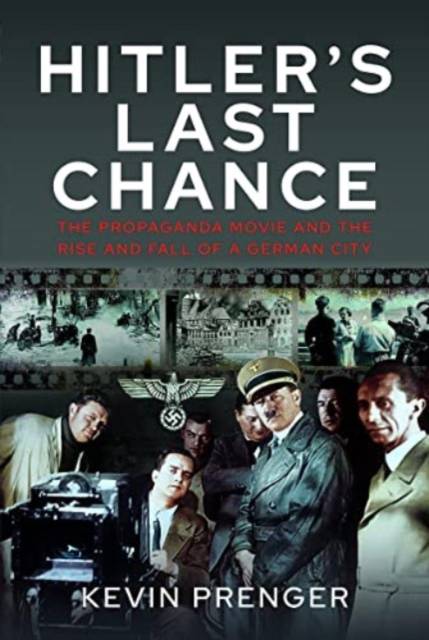
- Retrait gratuit dans votre magasin Club
- 7.000.000 titres dans notre catalogue
- Payer en toute sécurité
- Toujours un magasin près de chez vous
- Retrait gratuit dans votre magasin Club
- 7.000.0000 titres dans notre catalogue
- Payer en toute sécurité
- Toujours un magasin près de chez vous
Hitler's Last Chance
Kolberg: The Propaganda Movie and the Rise and Fall of a German City
Kevin Prenger
Livre relié | Anglais
30,95 €
+ 61 points
Description
"A book about an obscure Nazi propaganda movie proved an entertaining diversion from the usual military history books."
- Historical Miniatures Gaming Society
The war in Europe was reaching its cataclysmic final months with Germany surrounded on all sides. Hitler's forces had been driven from Poland by the Red Army and the Soviets were poised a short distance from Berlin, while the Western allies, having repulsed the Führer's Ardennes offensive, were preparing to cross the Rhine.
More than ever, Hitler needed his people to stiffen their resolve for the coming onslaught. To demonstrate what will be expected of the German people, and what they could achieve if they refused to acknowledge defeat, a major feature film would be shown, featuring the one place which held out against Napoleon when he invaded Prussia in 1807 - the city of Kolberg.
After crushing the Prussian Army in 1806, French forces swept into the Prussian province of Pomerania. One by one the Prussian fortresses surrendered, mostly without offering any resistance, except for Kolberg. The small and weakly-fortified city held out for four months despite being surrounded by Napoleon's forces, with Major von Gneisenau organizing a citizen's militia to aid the Army in its defense. Though much of the city was blasted into ruin, Kolberg remained in Prussian hands until the war with France ended with the signing of the Peace of Tilsit, by which time its defense had become legendary.
Even though the Third Reich was literally entering its death-throes, in attempting to reproduce the siege of Kolberg on film, thousands of experts, extras and horses were taken from the war effort by the Reich Minister of Propaganda, Joseph Goebbels. The film's emphasis was to show how civilians and the military can work together to save Germany - just as Kolberg had been saved from the French. The result has been stated to be the most expensive feature film ever made in Germany.
This book examines the dramatic conditions under which the film was produced, and the scale of the resources needed to do so, followed by its first showing on 30 January 1945. All Goebbels' efforts, though, were to no avail, as the film never went on general release. A month later, as the author reveals, Kolberg found itself under siege once again, but this time, after bitter house-to-house fighting, it fell to the Soviets in less than four weeks.
- Historical Miniatures Gaming Society
The war in Europe was reaching its cataclysmic final months with Germany surrounded on all sides. Hitler's forces had been driven from Poland by the Red Army and the Soviets were poised a short distance from Berlin, while the Western allies, having repulsed the Führer's Ardennes offensive, were preparing to cross the Rhine.
More than ever, Hitler needed his people to stiffen their resolve for the coming onslaught. To demonstrate what will be expected of the German people, and what they could achieve if they refused to acknowledge defeat, a major feature film would be shown, featuring the one place which held out against Napoleon when he invaded Prussia in 1807 - the city of Kolberg.
After crushing the Prussian Army in 1806, French forces swept into the Prussian province of Pomerania. One by one the Prussian fortresses surrendered, mostly without offering any resistance, except for Kolberg. The small and weakly-fortified city held out for four months despite being surrounded by Napoleon's forces, with Major von Gneisenau organizing a citizen's militia to aid the Army in its defense. Though much of the city was blasted into ruin, Kolberg remained in Prussian hands until the war with France ended with the signing of the Peace of Tilsit, by which time its defense had become legendary.
Even though the Third Reich was literally entering its death-throes, in attempting to reproduce the siege of Kolberg on film, thousands of experts, extras and horses were taken from the war effort by the Reich Minister of Propaganda, Joseph Goebbels. The film's emphasis was to show how civilians and the military can work together to save Germany - just as Kolberg had been saved from the French. The result has been stated to be the most expensive feature film ever made in Germany.
This book examines the dramatic conditions under which the film was produced, and the scale of the resources needed to do so, followed by its first showing on 30 January 1945. All Goebbels' efforts, though, were to no avail, as the film never went on general release. A month later, as the author reveals, Kolberg found itself under siege once again, but this time, after bitter house-to-house fighting, it fell to the Soviets in less than four weeks.
Spécifications
Parties prenantes
- Auteur(s) :
- Editeur:
Contenu
- Nombre de pages :
- 192
- Langue:
- Anglais
Caractéristiques
- EAN:
- 9781399072977
- Date de parution :
- 23-03-23
- Format:
- Livre relié
- Format numérique:
- Genaaid
- Dimensions :
- 155 mm x 234 mm
- Poids :
- 484 g

Les avis
Nous publions uniquement les avis qui respectent les conditions requises. Consultez nos conditions pour les avis.






